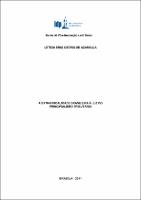Use este identificador para citar ou linkar para este item:
https://repositorio.idp.edu.br//handle/123456789/3966| Título: | A extrafiscalidade brasileira à luz do principialismo tributário |
| Autor(es): | Azambuja, Letícia Erig Osório de |
| Orientador(es): | Viana, Ulisses Schwarz |
| Palavras-chave: | Direito tributário;Extrafiscalidade;Imposto;Legislação |
| Data de submissão: | 2022 |
| Citação: | AZAMBUJA, Letícia Erig Osório de. A extrafiscalidade brasileira à luz do principialismo tributário. 2022. 70 f. Monografia (Especialização em Direito Tributário e Finanças Públicas). — Instituto Brasiliense de Direito Público, Brasília-DF, 2011. |
| Resumo: | Usualmente, as pessoas chamam de impostos todas as obrigações de
pagar ao Estado que visam à arrecadação ("encher os cofres públicos"). Tais
"impostos" são, na verdade, o que chamamos de "tributos". Ainda existe a
extrafiscalidade tributária, menos conhecida pelas pessoas em geral,
consistente na utilização da arrecadação para fins não fiscais (fins não
meramente arrecadatórios) – trata-se de uma exceção, contudo, de uso muito
freqüente. O presente trabalho teve, basicamente, como objetivos, estudar o
Direito Tributário à luz doprincipialismo. Para tanto, por meio de revisão de
literatura, uma análise dos principais aspectos dos princípios de Direito
Tributário e das manifestações mais freqüentes de extrafiscalidade no Brasil foi
realizada. Assim, pudemos notar que a extrafiscalidade é hoje um meio eficaz
de promover a regulação dos mercados e controlar os hábitos (desejados) da
sociedade. Ela ocorre por meio de estímulos, com incidências tributárias
quantitativamente menores, ou desestímulos, incidências quantitativamente
maiores. As formas mais comuns são: seletividade, isenção, imunidade, nãoincidência, redução/aumento de alíquotas ou critérios de base de cálculo,
alíquota zero, moratória e concessão de incentivos fiscais. Por fim, mostrou-se
necessário que, na busca dos fins da extrafiscalidade, a aplicação de princípios
(essenciais à manutenção de suas finalidades últimas) ampliemos o restrito rol
de princípios tradicionalmente tributários. |
| Abstract: | People usually call taxes all the obligations to pay that are used to get money to the State (“to fill the public coffers”). Such “taxes” are, in the truth, what we call “tribute”. There is still the extra fiscal taxes/tariffs, less known by the people in general, it consists in the use of the getting money for not for really fiscal ends - what represents an exception, however, of very frequent use. The present research had, basically, as objectives, to study the Tax law under the perspective of the Bioethics, searching the application of that one as an effective application tool of their principles. To do that, by literature research, an analysis of the main aspects of the principlism and the most frequent manifestations of extra fiscal tributes in Brazil was made. Thus, we could realize that the extra fiscally is today an efficient way to promote the regulation of the markets and to control the (desired) habits of the society. It all occurs under stimulations, with lower quantitative tax incidences or higher quantitative tax incidences. The most common ways are: selectivity, exemption, immunity, notincidence, reduction/increase the aliquot or the base of calc, zero aliquot, moratorium and concession of tax incentives. Finally, we found necessary, in the search of the ends of extra fiscally, the application of principles (essential to the maintenance of its last purposes) the extension of the restricted roll of principles traditionally tributaries. |
| URI: | https://repositorio.idp.edu.br//handle/123456789/3966 |
| Aparece nas coleções: | Outras Especializações |
Arquivos associados a este item:
| Arquivo | Descrição | Tamanho | Formato | |
|---|---|---|---|---|
| MONOGRAFIA_LetíciaErigAzambuja_Especialização_2011.pdf | 499.35 kB | Adobe PDF |  Visualizar/Abrir |
Os itens no repositório estão protegidos por copyright, com todos os direitos reservados, salvo quando é indicado o contrário.
